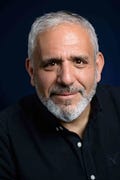Professor Ephraim (Effie) Shoham-Steiner is a historian specializing in Medieval Jewish History. He is an associate professor at the Department of Jewish History at Ben-Gurion University of the Negev in Be’er Sheva (BGU). He is also the director of The Center for the Study of …
Listen to this episode with a 7-day free trial
Subscribe to Israel from the Inside with Daniel Gordis to listen to this post and get 7 days of free access to the full post archives.
















